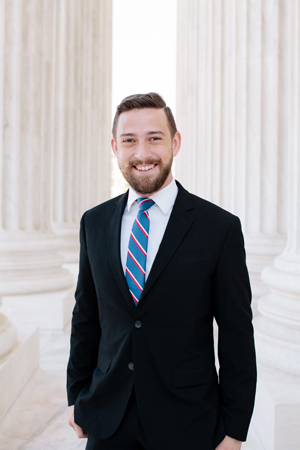3L Cody Ray Milner Cited in D.C. Circuit Concurring Opinion

By Suzi Morales
Scalia Law 3L Cody Ray Milner has for years been interested in allocation and separation of governmental powers. “I’ve always been fascinated by the D.C. Circuit,” he says, noting that the U.S. Court of Appeals for the D.C. Circuit regularly addresses questions within the scope of his interest.
That’s why it was not surprising that Milner was recently texting with a friend about a new separation of powers decision. What was surprising was the friend’s response telling Milner that his student comment had been cited in the decision.
On January 19, 2021, the D.C. Circuit issued a decision in American Lung Association v. Environmental Protection Agency, Case No. 19-1140, vacating a rule adopted by the EPA to regulate power plant emission. Judge Justin Walker concurred in part and dissented in part, taking the position that the EPA was not authorized to regulate coal-fired power in the manner it did. Milner’s student comment for the George Mason Law Review was cited in a footnote to Walker’s opinion - along with multiple Supreme Court Justices and other sources - in support of Walker’s statement that “whatever multi-billion dollar regulatory power the federal government might enjoy, it’s found on the open floor of an accountable Congress, not in the impenetrable halls of an administrative agency.”
“It is a rare honor for a judge to cite a student’s comment in an opinion,” says Professor Caroline Cecot. “It is a testament to the thoughtfulness of Cody Ray’s legal analysis on such a timely and important issue.”
Milner’s comment, “Into the Multiverse: Replacing the Intelligible Principle Standard With a Modern Multi-Theory of Nondelegation,” was published in the George Mason Law Review, where he serves as Executive Editor, in December. The article proposed that the current standard that a delegation of legislative power to an administrative agency is Constitutionally permissible if there is an intelligible principle supporting the delegation should be replaced by a more flexible standard.
According to Prof. Cecot, Milner’s “proposed modern approach is thoughtful, responding to many of the concerns raised by the justices interested in altering the current approach to enforcing the [nondelegation] doctrine.”
Milner says the idea for his comment grew out of a Scalia Law seminar he had recently taken on the subject of separation of powers featuring Supreme Court Justice Neil Gorsuch. Shortly before the seminar, Gorsuch had written what Milner describes as a “very fiery dissent” in Gundy v. United States, Case No. 17-6086, proposing a new nondelegation test.
“There is now a majority of justices on the U.S. Supreme Court willing to reconsider the nondelegation doctrine,” notes Prof. Cecot.
“The most amazing thing about the time here at Scalia Law is the opportunities we can experience that aren’t available at other law schools,” says Milner, like opportunities to learn from high-profile judges.
Following graduation, Milner will be clerking for Judge Patrick Wyrick of the U.S. District Court for the Western District of Oklahoma, followed by Judge Eric Murphy in the Sixth Circuit Court of Appeals. Eventually, he would like to practice in appellate litigation.